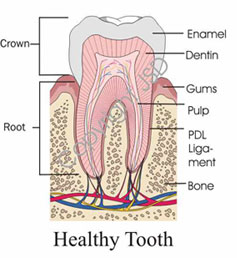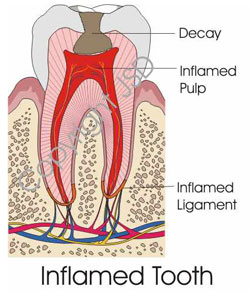About Endodontics
Endodontics - a root canal specialty

Endodontics is the specialty of dentistry recognized by the American Dental Association that deals with diseases and treatment of the dental pulp and its supporting structures. When you look at your tooth in the mirror, what you see is the crown. The rest of the tooth, the portion hidden beneath the gum line, is called the root. The outermost layer of the tooth is the hardest tissue in the body and is called ENAMEL. Enamel is supported by a hard inner layer called DENTIN that contains soft PULP tissue in its central core. Pulp tissue is composed of blood vessels, nerves, and connective tissue that actually made the surrounding hard dentin during tooth development. Pulp tissue can become damaged or diseased when bacteria that are introduced into the pulp as a result of tooth decay, periodontal disease, tooth fracture or other problems.
The pulp receives its vitality from vessels that enter through small openings at the ends of the roots. Although the pulp is important during development of the tooth, it is not essential to maintain the tooth. Endodontic (root canal) treatment removes diseased pulp tissue from the tooth, often relieving pain or infection, allowing you to save the tooth and prevent further infection and inflammation. After endodontic treatment, the tooth continues to be nourished and maintained by the surrounding tissues.

Who Is An Endodontist?
An endodontist is a dentist who completed a 2-3 years of additional post graduate specialty training or residency program specific to the diagnosis and treatment of diseases of the dental pulp. All dentists are trained in diagnosis and endodontic therapy, however, this specialist training allows endodontists to deal with diseases of the dental pulp and supporting structures as well as diagnose facial pain and related problems at much more complex level. This additional background, experience, research, and skill gives Endodontists the ability to deal with many challenges.


Endodontists studied root canal techniques and procedures in greater depth, for diagnosis and treatment of more complex cases, as some teeth can be especially difficult to diagnose and treat. That is why you may have been referred to Dr. Tran, an endodontic specialist for his knowledge and expertise. Dr. Tran has performed and supervised thousands of endodontic procedures gaining valuable experience in diagnosis, prognosis, and treatment. Aside from providing treatment, Dr. Tran’s role is also that of an educator given his academic positions at Loma Linda University, University of WA, and UCSD. It is very important to Dr. Tran that patients understand why they require treatment, what treatment involves, and what they can do to ensure the best possible outcome. We believe that a properly informed patient has the best chance of achieving the optimal outcome.
What Is A Diplomate?
Dr. Kenny T. Tran is a Diplomate of the American Board of Endodontics. A Diplomate is also referred as "board certified". Endodontists are not required to become board certified, and unfortunately less than 25% do so. The commitment to become a Diplomate is significant, and takes between 2-8 years of additional work beyond Endodontic residency to complete. It is the highest credential that Endodontists can achieve, and represents a personal commitment to excellence within the specialty.
Upon completion of an Endodontic residency, graduates receive a certificate which allows them to declare their Endodontic specialty. Most of graduating Endodontists today will also likely be "board eligible" which means that they are qualified to pursue board certification. However, to become a Diplomate or achieve “board certification”, one must:
- Pass the Board's written examination of endodontic science and literature.
- Accumulate and present a detailed treatment portfolio of their own endodontic cases that demonstrate expert technical ability and judgment.
- Pass a series of oral examinations given by a panel of board examiners


